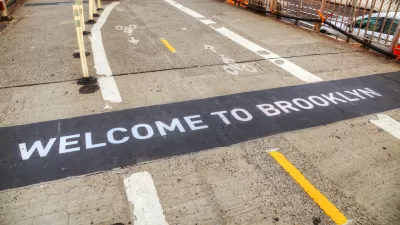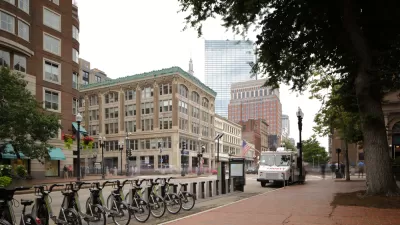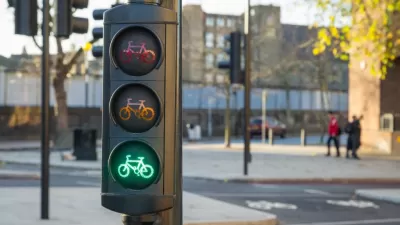The Christian Science Monitor argues why the growing popularity of bike-sharing programs across America will result in more cohesive communities and more livable places.
American cities are growing weary of their cars, and are yearning to slow down and spend more time in their local communities than behind the wheel. In a push to get people out of their sedans and into the streets, more cities are expanding bicycle infrastructure and implementing bike-share programs - "the newest form of public transit in the United States since the first subways were built more than a century ago."
Bike-sharing is becoming a reality in major cities across the country, like Los Angeles, Chicago, and New York, whose program "will be the largest outside Europe and China."
The Monitor's editors argue that, "Cities that are more bikable (and also walkable) allow for more personal interactions and better social cohesion than the car culture embraced in the 20th century. Bikes bring a slower, more intimate pace of life that can infuse more vitality into a city."
However, creating an urban bike culture, writes The Christian Science Monitor, requires more than just a bicycle and a willing rider. Cultivating a sense of respect between cyclists and drivers can be a challenging task, as "bicycling evangelists often create friction in their demands for more access. And car owners are reluctant to give up space to bike lanes, which are a necessity for bike safety." But with more cyclists comes enhanced safety, the article notes.
Cars are here to stay, but bike-sharing is proving to be a one-way ticket to friendlier communities.
FULL STORY: Why bike sharing will make cities friendlier

Alabama: Trump Terminates Settlements for Black Communities Harmed By Raw Sewage
Trump deemed the landmark civil rights agreement “illegal DEI and environmental justice policy.”

Study: Maui’s Plan to Convert Vacation Rentals to Long-Term Housing Could Cause Nearly $1 Billion Economic Loss
The plan would reduce visitor accommodation by 25% resulting in 1,900 jobs lost.

Why Should We Subsidize Public Transportation?
Many public transit agencies face financial stress due to rising costs, declining fare revenue, and declining subsidies. Transit advocates must provide a strong business case for increasing public transit funding.

Paris Bike Boom Leads to Steep Drop in Air Pollution
The French city’s air quality has improved dramatically in the past 20 years, coinciding with a growth in cycling.

Why Housing Costs More to Build in California Than in Texas
Hard costs like labor and materials combined with ‘soft’ costs such as permitting make building in the San Francisco Bay Area almost three times as costly as in Texas cities.

San Diego County Sees a Rise in Urban Coyotes
San Diego County experiences a rise in urban coyotes, as sightings become prevalent throughout its urban neighbourhoods and surrounding areas.
Urban Design for Planners 1: Software Tools
This six-course series explores essential urban design concepts using open source software and equips planners with the tools they need to participate fully in the urban design process.
Planning for Universal Design
Learn the tools for implementing Universal Design in planning regulations.
Smith Gee Studio
Alamo Area Metropolitan Planning Organization
City of Santa Clarita
Institute for Housing and Urban Development Studies (IHS)
City of Grandview
Harvard GSD Executive Education
Toledo-Lucas County Plan Commissions
Salt Lake City
NYU Wagner Graduate School of Public Service





























